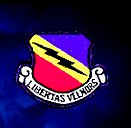| CHAPTER 11
BLACK WIDOW
Thirty-five days after Operation Desert Shield began, 675 U.S. Air Force aircraft were already deployed to the Middle East, nearly two-thirds of them fighters poised to defend the Saudi kingdom. While F-15 Eagles flew combat air patrols, E-3 AWACS surveillance aircraft orbited along Saudi Arabia's northern border, searching deep inside Iraqi airspace. Other fighters included dual-role F-15E Strike Eagles, F-4G Wild Weasels, F-111 Aardvarks,
A-10 Thunderbolts, F-117 Nighthawks, and F-16 Fighting Falcons. Each
of these was on standby alert and could be airborne within minutes if needed.In the meantime, the biggest airlift since Vietnam was operating at full force. Military Airlift Command (MAC) C-5, C-141, and C-130 aircraft traveled back and forth between the United States and the Middle East, delivering troops and supplies. In August alone, these aircraft flew more than 2,000 missions, hauling 72,000 troops and 106 million pounds of cargo to dozens of bases in the region.On Saturday, 22 September, Capt. Tom "Badger" Schmidt and I spent the afternoon building a LANTIRN
low-level map. After we finished, Lt. Col. Tim Nall called me into his office to discuss morale. He asked me to move out of the room I was in and into a room with other members of the
421st Black Widows. LANTIRN was quickly becoming a large priority for the wing, and since I was a Black Widow now, Lt. Col. Nall felt it would be better if I lived with other members of the unit. | |



